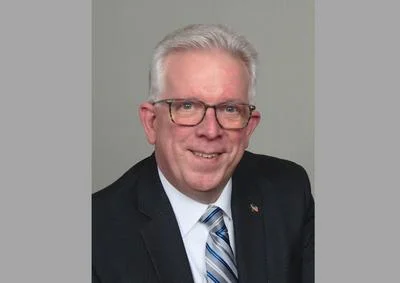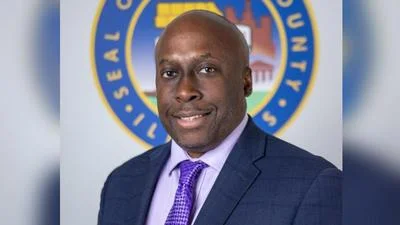If you want to understand better why our taxpayer-subsidized schools are so intellectually and morally bankrupt, look no further than Township High School District 211, the largest high school district in the state.
A recent candidate forum exposes the remarkable ignorance of most of the candidates running for election or reelection.
Since time and space permit a close examination of the answers to only one of the questions, let’s take a stab at the most important one:

Peter Dombrowski,
| D211
“If elected, what role if any would your religious and non-religious belief systems play in policymaking?” (49:47)
Aiden Branss: “Well, I do have my own religious beliefs, but I'm going to keep those beliefs separate from the school board because church and the state should be separate.”
Mark Cramer: “Agree.”
Kim Cavill (*IRONY ALERT*): “I agree, church and state should be separate. It's an issue I feel very passionately about. I'm a Unitarian Universalist, and, uh, ‘the faith’—the system of ethics I subscribe to--itself is centered around … the separation of church and state, so I heartily agree.”
Jane Russell: “Ditto.”
Meenal Dewan: "I believe church and state should be separate. Religion is a very personal thing, and I think it should stay that way."
Michelle Barron: "I agree with my other candidates, definitely. There is no room for personal religious beliefs for any school board member to have. … there's no room for my own religious beliefs to be part of my decision-making as a board member. … So yes, I do not believe there's any room for any religious beliefs on the school board."
Steven Rosenblum: “My religious belief does not come into play my personal beliefs do not come into play in making decisions as a school board member, nor will it.”
There is one candidate, Peter Dombrowski, who acknowledged that his Catholic faith influences his decisions, and further, he acknowledged that the place of faith in his decision-making is a good thing. He is the only candidate worthy of serving on the school board.
The rest seem to have little to no understanding of the Constitution regarding religion or of the role religious faith has played in American history, including in the abolition of the slave trade, the institution of slavery, and Jim Crow laws. Do they know that Rev. Martin Luther King Jr. wrote this in his “Letter from Birmingham Jail”:
How does one determine whether a law is just or unjust? A just law is a man-made code that squares with the moral law or the law of God. An unjust law is a code that is out of harmony with the moral law. To put it in the terms of St. Thomas Aquinas: An unjust law is a human law that is not rooted in eternal law and natural law.
D211 community members should hope that no student watches this video and hears the ignorant statements made by every candidate except Peter Dombrowski.
Let’s take a closer look at some of the responses.
Branss, Russell, and Dewan expressed the wholly un-American notion that church and the state must not in any way commingle.
While Cramer too expressed this troubling view, historically he has supported good policy positions in the face of strident “progressive” opposition.
Michelle Barron went a step further in the way wrong direction, saying, “There is no room for personal religious beliefs for any school board member to have. … I do not believe there's any room for any religious beliefs on the school board.”
In Barron’s religious dystopia, no one serving on a school board may have any religious beliefs. Someone may want to explain to her that Article VI of the Constitution prohibits religious tests for holding office. And while they’re at it, they should probably tell her that Title VII of the Civil Rights Act of 1964 prohibits discrimination based on religion.
Here’s a primer on religion and government for these and any other candidates running for school boards:
The Establishment Clause states that “Congress shall make no law respecting the establishment of religion.” That does not mean religious convictions are prohibited from informing the decisions of government leaders. To expect or demand that decisions made by government leaders be divorced from personal religious beliefs is an untenable, unconscionable breach of the intent of the First Amendment, which also includes the oft-neglected Free Exercise Clause which states that Congress shall make no law prohibiting the free exercise of religion. People of faith exercise their religion everywhere, including outside of their homes, churches, synagogues, temples, and mosques.
For people of faith, their religion informs all of their life—all values, beliefs, and decisions. To paraphrase Christian writer and founder of First Things magazine, Richard Neuhaus, that which is political is moral and that which is moral, for religious people, is religious. It is no less legitimate to have school policy decisions informed by religion than by psychology, philosophy, or subjective feelings.
Heartland Institute Board Chairman and Chicago attorney Joseph A. Morris clarifies the relationship between the church and state:
Every individual, whether or not in public office, should be free to hold religious beliefs and to act upon them in the conduct of their lives, including in the formation of ethical and moral judgments. We expect public officials to act, subject to constitutional and legal principles and constraints, to make policy. We expect them to enact and pursue policies that are ethical and moral. The ethical and moral principles that guide them may very well be religious in inspiration.
For example, candidate Peter Dombrowski who pointed out that, as a lifelong Catholic he was ‘taught by nuns’ to act in accordance with ‘The Golden Rule,’ thus offered a simple, concise, and useful illustration of how religious belief may properly influence one's public conduct.
Leftists often abuse the concept of a separation between church and state to silence conservative people of faith. They appeal to Thomas Jefferson’s extra-constitutional metaphor about “a wall of separation,” which was written to the Danbury Baptist Association in Danbury, Connecticut to offer them assurance that the government would not interfere in the free exercise of their religion.
Leftists often suggest erroneously that this metaphor points to an impregnable barrier between religion and the government. The Establishment Clause of the First Amendment, however, was intended to prevent the establishment of a state religion—not to prevent religious values from informing political decisions.
All laws reflect or embody someone’s morality. The moral views of people who hold theistic worldviews are no less valid in the public square than the moral views of those who hold atheistic worldviews—which are faith-based also.
Take note of the irony that Cavill, arch-proponent of an absolute separation of church and state, appealed to her religious tradition as justification for her position. Cavill averred that she believes in this impregnable barrier between the church and state because her religious tradition teaches it. In other words, her basis for demanding that school board members sever their faith from their decisions is her religion.
Of course, the same people who argue vociferously against the presence of religiously informed political decisions that are conservative in nature are curiously silent regarding those “progressive” Catholics, Jews, United Methodists, Presbyterians, Lutherans, Unitarians, and Episcopalians whose political activities are informed by their religiously derived values and beliefs.
If there is a secular purpose for a school policy (e.g., to ensure a safe environment by prohibiting sexually integrated locker rooms), then the motives of any candidate voting for it are not the business of any government agent. One board member may support such a policy based on beliefs and values derived from her faith. An atheist board member may support it on philosophical grounds unrelated to religion.
It would be not only absurd but also unethical for any community member, school administrator, or board member to try to ascertain the motives behind anyone’s opposition to co-ed locker rooms and equally unethical for anyone to assert that only those who have no religious faith may support such a school policy. Such an assertion would most assuredly violate the Free Exercise Clause of the First Amendment.
The government must not impose policies or laws that are solely religious in nature. There should be no laws requiring the observance of any particular religion; or laws governing baptismal practices; or laws requiring prayer; or laws requiring circumcision.
But, for example, people whose faith points to the worth of all people may legitimately work toward enacting laws that oppose capital punishment, euthanasia, or abortion. People whose religious beliefs include pacifism may legitimately work toward preventing or stopping military engagements. No one—including school board members—is constitutionally or morally obligated to divorce their faith from their political decisions.
Remember that when you head to your polling places to cast your ballots for school board candidates in a few weeks.
This story was originally published by Breakthrough Ideas. Read the original HERE.





 Alerts Sign-up
Alerts Sign-up